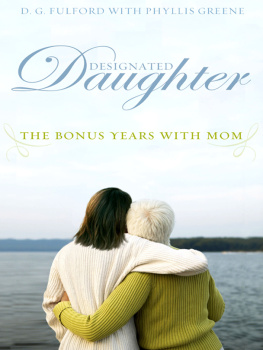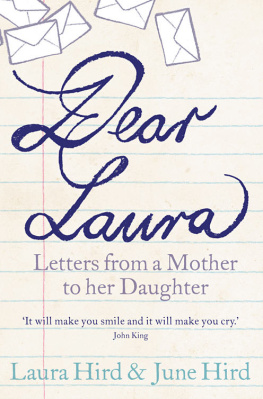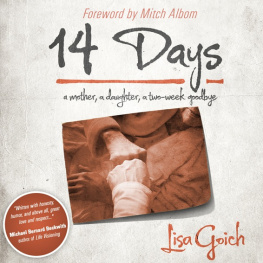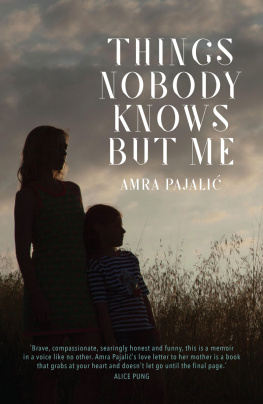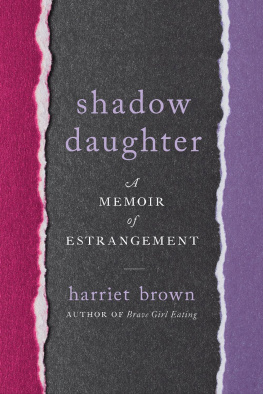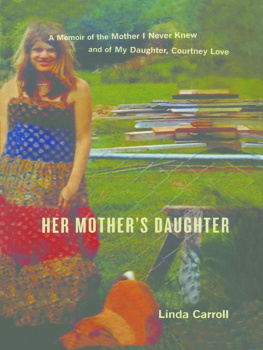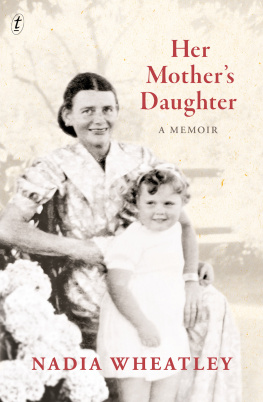D. G. Fulford with Phyllis Greene
Bambis mother had barely started to eat when abruptly she stopped and lifted her head to sniff the air. She glanced from side to side as if she were trying to hear something.
Bambi, she whispered. But he was so busy eating that he didnt hear her.
Bambi! she said in terror.
Startled, Bambi looked up at her.
The thicket! she cried, and the two of them sprang toward the forest.
W HEN MY MOTHER became a widow, I became a Designated Daughterthe sibling who would try to take up the empty space that had always been filled by Dad. What I found in walking beside her was my own strong space. Designated Daughter is the story of what happens when a mother needs her daughters help and the daughter gets more help in return than she could ever give.
This is my mothers story, too. She adds her voice at the end of each chapter. Im glad youll get to hear the insight and wisdom that has been guiding me all these years.
Designated Daughters are all over the country, all over the world. We are a secret society of women, instantly recognizable to one another. We sit in doctors waiting rooms holding our mothers hands. We hold the coats, we hold the purses, we hold our mothers arms like suitors. We become so close, so bonded, we form a two-person silhouette.
My mother needed me, so I moved home to Ohio after twenty years away. Our lives began to merge and mesh. We had our glory days and our travels. I became a grandmother. She became a great-grandmother. We went to lectures, we went to lunch, we went to funerals, a lot. We have had a wondrous eight years together. Each year brings its own kind of change for my mother, and for me.
For the first five years after I came home, Mom was energetic and in de pen dent, running around like the active woman shed been for eighty years. Then, three years ago, it was if wed walked through a transparent door from health to sickness. She became frail, she fell in her living room, she fell in the Nordstrom parking lot. She hasnt driven for a while and can hardly walk.
But boy, can she write.
Eight years ago, my uncle Al, Moms brother, called me in Nevada to congratulate me on my good decision to move back home. It never felt like a decision. It was the only thing my soul would let me do. I was being offered the chance to spend invaluable time with my vibrant mother, a gift of incalculable worth. Bonus years.
At my mothers knee, at middle age, I learned to celebrate knowing what you have when you have it. Each day we have together is one of poignant exaltationthe last dip in the pool at the end of a late-summer day.
Y OU LEARN TO read between the lines in obituaries. Suddenly can mean a suicide or an accident or a murder. Unexpectedly tweaks the imagination. After a long illness sends the reader rushing to the bottom of the obit, where In lieu of flowers reveals what the long illness was. After a long, courageous battle depletes me when I read it. My life has not been combative. I do not want my death to be.
Today, for the very first time, I saw my demographic referred to in an obituary. It was not defined in so many words, but a Designated Daughter can recognize another Designated Daughter anywhere.
Mrs. Lennox, eighty-seven, died. She is survived by four children, Edward, Mark, Kenneth, and Linda, who for more than the last three years provided constant and loving care to her mother, the obituary read. There it was in print, akin to an M.D. or a Ph.D. after Lindas name. Linda had earned her D.D.
A RENT YOU? a woman asked, trying to remember my name as she wheeled her mother out of Dr. Shells waiting room.
Yes, I am, I said to the woman, whom I recognized from my fourth-grade class. I hadnt seen her in de cades. I was guiding my own aging mother out from the elevator and in through the door.
There are daughters who, like me, work at home and have time to share, and those who are superhuman, caring and doing for a parent along with careers, commutes, children, and spouses. We are in every circumstance and walk of life. We are the people in the family who can.
Designated Daughters do the driving. We have our mothers garage-door opener on the car visor next to our own. Our mothers house key is on our key ring. We let our mother sit while we take her insurance and credit cards up to the counter for copays. We sign her name in our handwriting. We check out her library books.
Two purses on a shoulder: the universal symbol of the Designated Daughter. We walk at a slower pace, beside our mothers, or behind them when they use a wheelchair. We compliment other mothers on their fanciful canescompliments heretofore reserved for good-looking handbags or silk scarves. We notice aluminum walkers with wheels and a seat, then we go check them out at Wal-Mart. Mom sits on the bench in front while I go off to look. A few years ago, she could jump into her car and do errands with energy left over. Now I drive on the few days she feels like going out. Sometimes she stays in the car in the parking lot. Sometimes these days break my heart.
W E HAVE OUR own cadence and language, my mother and I. Were comfortable and companionable even if were sitting in silence. I call her at nine-thirty every morning. We have coffee together this way. We talk about war and whats for dinner.
Id like to report, my mother said at the end of a soul-sapping gray day in winter, that this has been the most boring day in the history of the world.
My mouth wont even move, it is so bored with me, I told her.
Yet we talk. We always have someone to talk to. We always have someone to listen. This is the promise weve made to ourselvestwo women alone together.
One day we were having lunch at Nordstrom and saw a Designated Daughter we knew, by herself at a table. Her mother had died a few months before. The chair beside her was filled with shopping bags, but more visible, if possible, was the absence of her mother. We grabbed the daughters hands and squeezed them on our way out. She had tears in her eyes, as did we.
I AM THE needful mother of this Designated Daughter, and we are companions on a beautiful road to journeys end. We are not alone; lumbering along is an elephant, the pachyderm touched by the six blind men who want to know what an elephant is. Because each one touches a different part of the animal, they disagree when they attempt to describe him. Like those men, my daughter and I have different perspectives. She is fifty-seven and I am eighty-seven. Even though we walk together, the length of the road looks different to each of us, as do the hills and valleys ahead.
She is D.G., and I am Phyllis.
This elephant has a name as well.
His name is DEATH .
I hate him.
I N MY MIND, the picture of this walk is ludicrous and makes me laugh. (In the first place, I havent been able to walk much at all for a few years.) We both plan to ignore the elephant, but has anyone ever been able to do that? Once Debby has found a place for me to sit down, she shoos the elephant away, and we concentrate on the matters of the day. I can still (thank God) see and hear and think and speak. The white hair and the wrinkles and the shrinkage are real, but we both pretend it is a disguise.
I remember almost all of the last century and am seven years into this one. I remember that on the day we were to leave the hospital with our new baby girl, the ob/gyn left a bill on my pillow for two hundred dollars. We paid it by borrowing from her two-year-old brothers savings account! I dont have to remember the greatest generation. I am the greatest generation. Nostalgia is my daily reverie and the context of the bittersweet stroll we are taking.

